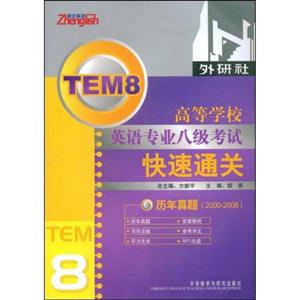-
>
鲍勃·迪伦诗歌集:1961-2012:典藏版
-
>
双城记-英文版
-
>
四级词汇词根+联想记忆法:乱序版
-
>
The secret garden
-
>
哈克贝利.费恩历险记/床头灯英语.2000词读物(英汉对照)
-
>
10000德语分类词汇联想记忆
-
>
英语词汇全书
TEM8高等学校英语专业八级考试快速通关:历年真题(2000-2008)含光盘 版权信息
- ISBN:9787560081298
- 条形码:9787560081298 ; 978-7-5600-8129-8
- 装帧:暂无
- 册数:暂无
- 重量:暂无
- 所属分类:>>
TEM8高等学校英语专业八级考试快速通关:历年真题(2000-2008)含光盘 本书特色
振宇英语系列丛书自出版以来,销量一直稳居全国考试类图书前列,已成为广大考生喜爱的全国知名图书品牌。《高等学校英语专业八级考试快速通关:历年真题》(2000-2008)是其中一册!“高等学校英语专业四级/八级考试快速通关”系列丛书由北京高校从事英语专业四级、八级考试研究与辅导的专家与一线教师精心编写,并在部分院校试用,有效帮助考生实现考前快速突破,受到一致好评。
TEM8高等学校英语专业八级考试快速通关:历年真题(2000-2008)含光盘 目录
TEM8高等学校英语专业八级考试快速通关:历年真题(2000-2008)含光盘 节选
《高等学校英语专业八级考试快速通关:历年真题》(2000-2008)收集了从2000年到2008年9年的真题,并附有答案详解与听力原文,这样考生做完试卷后就可以迅速便捷地获得自己的测试成绩,然后就错题有选择性地查阅解析。《高等学校英语专业八级考试快速通关:历年真题》(2000-2008)解析全面详实,其中阅读部分增加了“篇章难词突破与原句译文”,一方面帮助大家扩大词汇量,另一方面也对文中的长难句进行了深入的分析。除此之外,在这几年新增的“人文知识题”的解析中,作者以厚积薄发的功力为读者做了人文知识考核内容的详细解析,我们相信,这对于准备英语专业八级考试的学生是非常实用和必要的。概括地说,《高等学校英语专业八级考试快速通关:历年真题》(2000-2008)有如下特点:(1)历年真题,原汁原味。我们为广大考生提供了从2000年到2008年共9套真题,以确保考生真切地感受到英语专业八级考试在9年时间里的发展变化与命题脉络。(2)权威解读,重点点拨。我们请长期从事英语专业八级考试指导、具有丰富经验的北京高校老师为大家给出参考答案。并做了简炼而准确的解析,并请美国专家对作文范文、翻译译文都作了精准把握与润色,尽可能地为考生提供规范权威的答案版本。不仅如此,我们还对写作、阅读词汇、难句译文和人文知识等部分作了精彩点拨。(3)精心策划。编排合理。我们在仔细研读9年英语专业八级考试的基础上,对历年真题的听力部分作了答案重点标注,让大家便捷而高效地核对听力原文。随书配有清晰流畅、语速标准的mp3,让考生真实地感受考场气氛。
TEM8高等学校英语专业八级考试快速通关:历年真题(2000-2008)含光盘 相关资料
Agricultural production in most poor countries accounts for up to 50% of GDP, compared to only 3% in rich countries. But most farmers in poor countries grow just enough for themselves and their families. Those who try exporting to the West find their goods whacked with huge tariffs or competing against cheaper subsidized goods. In 1999 the United Nations Conference on Trade and Development concluded that for each dollar developing countries receive in aid they lose up to $14 just because of trade barriers imposed on the export of their manufactured goods. It's not as if the developing world wants any favours, says Gerald Ssendwula, Uganda's Minister of Finance. "What we want is for the rich countries to let us compete."Agriculture is one of the few areas in which the Third World can compete. Land and labour are cheap, and as farming methods develop, new technologies should improve output. This is no pie-in-the-sky speculation. The biggest success in Kenya's economy over the past decade has been the boom in exports of cut flowers and vegetables to Europe. But that may all change in 2008, when Kenya will be slightly too rich to qualify for the "least-developed country" status that allows African producers to avoid paying stiff European import duties on selected agricultural products. With trade barriers in place, the horticulture industry in Kenya will shrivel as quickly as a discarded rose. And while agriculture exports remain the great hope for poor countries, reducing trade barriers in other sectors also works: African Growth and Opportunity Act, which cuts duties on exports of everything from handicrafts to shoes, has proved a boon to Africa' s manufacturers.The lesson: the Third World can prosper if the rich world gives it a fair go.This is what makes Bush's decision to increase farm subsidies last month all the more depressing. Poor countries have long suspected that the rich world urges trade liberalization only so it can wangle its way into new markets
-
新长征--2010英语专业八级词汇全真考典
¥8.4¥24.8 -
2022图书×抽奖盲袋
¥9.9¥25 -
2023读书月阅读盲盒——天黑,闭眼,刀谁?
¥42.3¥158 -
2022读者节纪念徽章-三星会员专属
¥45¥45.6 -
2023读书月阅读盲盒——我什么场面没见过?
¥42.3¥158
小学生诗词故事·一上
¥14.8¥28.0















